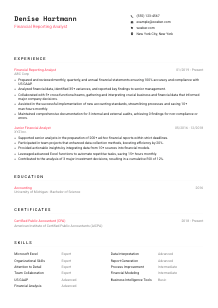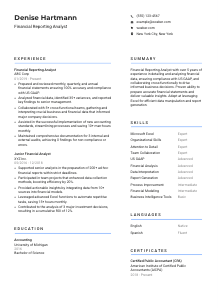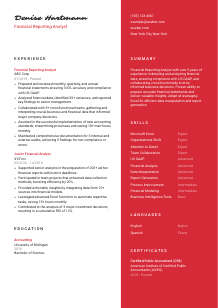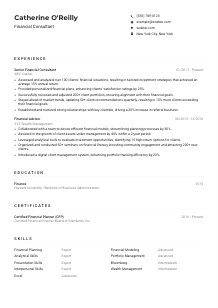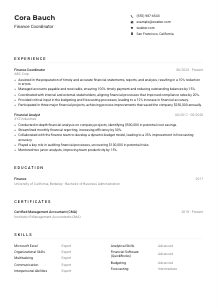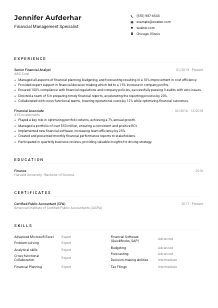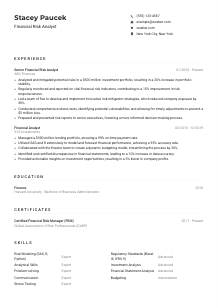Financial Reporting Analyst Resume Example
Juggling with financial figures, but your resume doesn't add up? Explore this Financial Reporting Analyst resume example, collated using Wozber free resume builder. Learn how to blend your reporting prowess with job requirements, presenting your fiscal fluency in a way that makes your career graph soar straight to the top!
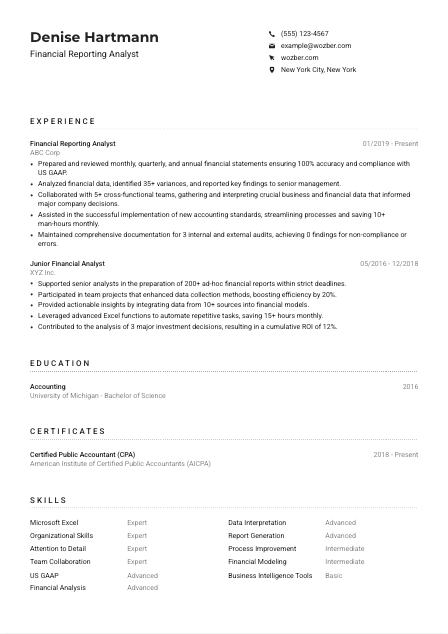
How to write a Financial Reporting Analyst resume?
Navigating the highly specialized world of financial reporting requires not just expertise in numbers, but the ability to present your skills and experience in a compelling resume. When it's time to step into or advance within the role of a Financial Reporting Analyst, you're not just crunching numbers – you're telling a story. Here, we're diving deep into how to tailor your resume with precision, mirroring the job description closely, and making every word count.
Using Wozber's free resume builder, let's unlock the secrets to crafting a resume that not only passes the Applicant Tracking Systems (ATS) but also resonates with the hiring managers of your dream job.
Personal Details
The Personal Details section of your resume is much more than just your contact information; it's your opening act. This is where you set the tone for everything that follows, ensuring you align perfectly with the role of a Financial Reporting Analyst right from the start.
1. Name & Branding
Start with your name, making sure it's the marquee of your personal brand. A clear, larger font here makes your name memorable. Remember, in the realm of financial reporting, clarity and visibility are key.
2. Job Title Alignment
Below your name, align with your intended role by explicitly stating "Financial Reporting Analyst." This alignment not only shows your clear intent but also helps with ATS optimization, as it matches a critical keyword from the job description.
3. Essential Contact Details
Include your phone number and a professional email address. In the era of digital communication, these elements are your lifelines to potential employers. Ensure there are no typos – accuracy is fundamental in the financial domain.
4. Location Confirmation
"New York City, New York" resonates with the job's geographical requirement. This detail is crucial, as it confirms your proximity to the job location, eliminating any concerns about relocation.
5. Professional Online Presence
Linking a LinkedIn profile or personal website can provide a broader picture of your professional journey. Make sure these platforms are polished and echo the details of your resume, offering a cohesive narrative of your career.
Takeaway
Functioning as your resume's introduction, your personal details must be flawlessly presented and fully aligned with the position you're targeting. Keep this section sharp and succinct, paving the way for a strong first impression. It's your handshake in written form; make it count.





Experience
The Experience section is where you transform from a candidate into a compelling story. For a Financial Reporting Analyst, each job and task you list should reflect not just your responsibilities, but how you've excelled and made a tangible impact.
- Prepared and reviewed monthly, quarterly, and annual financial statements ensuring 100% accuracy and compliance with US GAAP.
- Analyzed financial data, identified 35+ variances, and reported key findings to senior management.
- Collaborated with 5+ cross‑functional teams, gathering and interpreting crucial business and financial data that informed major company decisions.
- Assisted in the successful implementation of new accounting standards, streamlining processes and saving 10+ man‑hours monthly.
- Maintained comprehensive documentation for 3 internal and external audits, achieving 0 findings for non‑compliance or errors.
- Supported senior analysts in the preparation of 200+ ad‑hoc financial reports within strict deadlines.
- Participated in team projects that enhanced data collection methods, boosting efficiency by 20%.
- Provided actionable insights by integrating data from 10+ sources into financial models.
- Leveraged advanced Excel functions to automate repetitive tasks, saving 15+ hours monthly.
- Contributed to the analysis of 3 major investment decisions, resulting in a cumulative ROI of 12%.
1. Requirements Mapping
Begin by dissecting the job description. For instance, "Prepare and review financial statements ensuring accuracy and compliance with US GAAP" directly correlates with experiences you should highlight.
2. Role & Company Clarity
Clearly list your job title, the company's name, and your dates of employment. This foundational structure helps hiring managers quickly understand where and when you've applied your skills.
3. Achievement-Focused Entries
"Analyzed financial data, identified 35+ variances, and reported key findings" is a perfect example of how to frame your contributions. It's specific, quantifiable, and directly linked to a core job responsibility.
4. The Power of Quantification
Whenever possible, quantify your achievements. Whether you've saved hours, increased efficiency, or managed a vast number of financial statements, numbers speak volumes, especially in financial analysis.
5. Relevance Reigns Supreme
Stray from listing unrelated duties. If you've crafted financial models or streamlined reporting processes, showcase these feats. If it doesn't relate directly to financial reporting or analysis, reconsider its inclusion.
Takeaway
Consider each bullet point an individual story of success. Tailor your experiences to reflect not just what you did but how you excelled and what you achieved. Your experience section is the backbone of your resume, demonstrating why you're not just a fit but the ideal candidate for the role.
Education
In financial reporting, your educational background serves as the bedrock of your expertise. It speaks to your foundational knowledge and your commitment to the field. Here's how to ensure your Education section reinforces your candidacy.
1. Highlighting Degree Relevance
The job calls for a "Bachelor's degree in Accounting, Finance, or a related field." Make sure your degree aligns directly with this requirement, just as our resume example showcases a Bachelor of Science in Accounting.
2. Structuring for Readability
Present your education in a clear format: Degree, Field, Institution, Graduation Date. This simplicity ensures the hiring manager can quickly confirm your qualifications.
3. Degree Specificity
If the role specifically mentions Accounting or Finance, and you have that degree, ensure it's prominently featured. This direct alignment can significantly boost ATS optimization.
4. Coursework and Extras
While the degree itself is paramount, relevant coursework, honors, or extracurricular engagements can add depth, especially for early career candidates. Highlight these if they strengthen your ties to the financial reporting field.
5. Continuous Learning
For roles in ever-evolving fields like finance, showing you're engaged in ongoing education can be a plus. Mention any additional certifications, workshops, or seminars that enhance your proficiency and commitment.
Takeaway
Your Education section is more than a list; it's a narrative of your commitment to your profession. Tailor this section to reflect not just what you learned, but how your educational journey has primed you for the specific challenges and opportunities of the Financial Reporting Analyst role.
Certificates
In the precision-driven world of financial reporting, certifications serve as badges of honor. They demonstrate your dedication to excellence and depth of expertise. Here's how to curate your Certificates section to highlight your professional dedication.
1. Direct Alignment
Prioritize certifications like CPA or CFA if they're mentioned in the job description. These distinguish you as a committed professional, signaling your proficiency and dedication to the specifics of financial analysis.
2. Quality Over Quantity
Rather than listing every certificate you've earned, focus on those most relevant to the Financial Reporting Analyst role. This selective approach ensures hiring managers immediately see your most pertinent qualifications.
3. Date Details
For certificates with validity periods or recent achievements, including the acquisition or expiration dates. This shows your credentials are current and that you're invested in keeping your expertise sharp.
4. Stay Abreast
The financial industry constantly evolves, necessitating continuous learning. Regularly update your certifications and pursue new ones that bolster your qualifications for roles like a Financial Reporting Analyst.
Takeaway
Your Certificates section isn't just a list; it's a testament to your ongoing commitment to your field. Carefully select certifications that boost your candidacy, signaling to potential employers your readiness and eagerness to excel in the role.
Skills
Your Skills section is a compact showcase of your capabilities, acting as a quick reference for hiring managers to gauge your fit for the role. For a Financial Reporting Analyst, highlighting both technical skills and soft skills is pivotal. Let's make this section count.
1. Match Job Description
Start by identifying both the explicit and implicit skills required in the job posting. Skills like "proficiency in Microsoft Excel" and "strong analytical skills" are often directly listed, making them prime candidates for inclusion.
2. Specificity Is Key
List hard skills relevant to financial reporting, such as "US GAAP compliance" and "financial modeling," alongside soft skills like "attention to detail" and "team collaboration." A well-rounded skills set speaks volumes.
3. Order & Organization
Prioritize your skills based on the job description's emphasis. Place the skills most critical for a Financial Reporting Analyst role at the top to catch the hiring manager's eye quickly.
Takeaway
Think of your skills section as your professional highlight reel. By carefully selecting and organizing your skills, you demonstrate your suitability and readiness for the challenges of the Financial Reporting Analyst role. Let this section shine as a concise testament to your capabilities.
Languages
In today's interconnected financial world, being multilingual can set you apart. While the primary language for most Financial Reporting Analyst roles is English, additional language skills can underscore your versatility and global readiness. Here's how to frame your linguistic abilities.
1. Essential Language Requirement
Since the job description specifies, "Must be adept in English," ensure English is listed first, marked as "Native" or "Fluent." This directly meets the job's fundamental language requirement.
2. Listing Other Languages
If you speak additional languages, list them to showcase your adaptability and potential reach in global markets. Even if not directly relevant, they highlight your ability to navigate multicultural environments.
3. Honesty in Proficiency
Clearly state your proficiency level using terms like "Fluent," "Intermediate," or "Basic." Accurate representation ensures expectations are set right, and there are no surprises down the line.
4. Role-Specific Benefits
For a position with international dealings or diverse teams, fluency in other languages is a standout asset. Connecting your language skills to potential role requirements can give you an edge.
5. Continual Learning
Even if your proficiency is at a basic level, showcasing your commitment to learning new languages can reflect well on your dedication to personal and professional growth.
Takeaway
The Languages section of your resume is a nod to your ability to thrive in diverse environments. It speaks to your cultural versatility and readiness to engage on a global stage. Highlight this asset, and consider it a unique flavor to your professional persona.
Summary
Your Summary is your elevator pitch – concise, compelling, and directly targeted at the Financial Reporting Analyst role. It's the first substantial text a hiring manager reads, making it crucial to get it just right. Let's craft a summary that makes them want to read on.
1. Capture the Job Essence
Digest the job requirements and reflect on how your experience aligns. Starting with an introduction like, "Financial Reporting Analyst with over 5 years of experience," sets a strong foundation.
2. Highlight Key Skills & Achievements
Incorporate skills and achievements that mirror the job description. Mentioning your expertise in Excel or your proficiency in GAAP, as shown in the given resume example, directly speaks to your readiness for the role.
3. Brevity & Impact
Keep your summary to 3-5 lines. This section should be impactful, drawing in the reader with a concise portrayal of your qualifications and how they translate to success in the role.
4. ATS-Friendly Keywords
Incorporate keywords from the job description into your summary. ATS-compliant resumes often include job-specific terms, making this an essential step for getting your resume seen by human eyes.
Takeaway
Your Summary is more than just an introduction; it's your first opportunity to communicate your fit for the Financial Reporting Analyst role. By focusing on what's most relevant and impactful, you set the stage for a resume that resonates deeply with potential employers. Let it be the hook that draws them in.
Launching Your Financial Reporting Analyst Journey
Crafting a resume that speaks directly to the wants and needs of hiring managers is an art – but it's one you're now well-equipped for. With these insights and the support of Wozber's free resume builder, complete with ATS-friendly resume templates and ATS resume scanner, you're ready to take the financial world by storm. Your journey as a Financial Reporting Analyst is filled with numbers and narratives, accuracy and achievements. Your resume is the ledger where your story begins.
Write it with precision, pride, and a personal touch. The next chapter of your career awaits.

- Bachelor's degree in Accounting, Finance, or a related field.
- Minimum of 3 years' experience in financial reporting or related roles.
- Proficiency in Microsoft Excel and other Office Suite applications.
- Strong analytical and organizational skills with high attention to detail.
- Certified Public Accountant (CPA) or Chartered Financial Analyst (CFA) designation preferred.
- Must be adept in English.
- Must be located in New York City, New York.
- Prepare and review monthly, quarterly, and annual financial statements ensuring accuracy and compliance with US GAAP.
- Analyze financial data, identify variances, and report findings to management.
- Collaborate with cross-functional teams to gather and interpret business and financial data.
- Assist in the implementation of new accounting standards and process improvements.
- Maintain documentation for internal and external audits, ensuring compliance with regulatory requirements.





